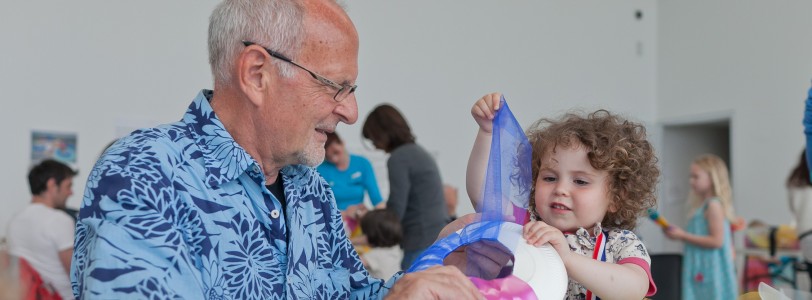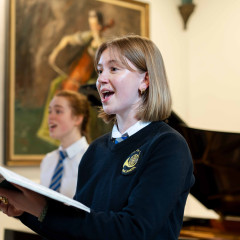Do the arts benefit the elderly?
I wish to write an article on the benefits towards the elderly that the arts can bring. I will be looking into the different types of art therapies to find out which is most beneficial and how it can benefit and improve the lives of the elderly because this is the field of work that I am interested to possibly go into in later life. With the ageing population ever increasing, challenges arise. These challenges include deterioration of a person's health, social isolation within communities, loss of loved ones along the way and all of the life transitions that an individual undertakes. As people age, memories can disappear and diseases such as Alzheimer's can occur which tends to slam the door, to communication and socialisation, shut. This is where the arts can come into play and be beneficial to the elderly. Arts and crafts and other creative projects can help alleviate boredom and keeps seniors' minds busy and may even help prevent feelings of depression. It has also been proven that arts and crafts help with hand eye coordination, cognitive abilities and concentration as stated on holidaytouch.com under the creativity and aging benefits of art on senior health section.
In 2011, recent studies had indicated that listening to music whilst taking part and engaging in physical exercise helps the elderly to maintain their balance whilst walking which is beneficial as it reduces their risk of falling. This is incredibly important because the risk of falling is a huge threat to the elderly as nearly a third of all senior citizens fall at least once during each year.Music is also a stimulant that makes people more engaged with the physical activities they do and in Sweden they created a study that "shows that engaging in physical activity, like dancing or working out, to piano music benefits the elderly more so that engaging in the same activities without music." Listening to music can also be stimulating for the brain and can increase psychological health through promoting good feelings and suppressing bad ones such as anxiety, this will allow the person to create a happier outlook on life and therefore making their lives better. I believe this to be factual due to past experiences of being able to relax during tense situations due to music being played, it allows me to go into my own safe place where I can be happy by myself.
Psychological and cognitive engagement is increasingly more important within the elder population because, as is found in a journal of the American Medical Association, exercising the brain is as important to keep the brain alert and strong as physical exercise is important to the keep the body strong and able to do things. Which is why creating things such as pottery and painting are recognised more as a form of art therapy which engages and helps the elderly benefit from the arts. Alternatively a way to stimulate the mind and give freedom of expression would be present when given tasks such as writing and creating music because when partaking in this they are able to express themselves and contribute what they have to offer to their peers and the world which can also develop them socially. This is increasingly beneficial if the person in question is learning something new as this engages and exercises the brain which ultimately promotes the brains health. Personally, I feel this is the most important aspect of aging because it is really important to keep the brain engaged and challenge it at times to develop it further and keep the person going mentally.
However, whilst thinking about all of these extensive and alternative ways to engage the elderly cognitively and physically we would have to think of capability, accessibility and costing. This is where small creative activities can be most beneficial, for example; a family tree, creating stories, family photo albums, holiday decorations or making scrapbooks. Each of these activities are joyous to take part in and to increase the fun, and display to the elderly that they are still loved and respected, family members such as grandchildren can come and join in making little memories to go around the house. Unfortunately it is easy for the elderly to feel forgotten because their loved ones live fast-paced lives; however, in receiving a gift from their grandchildren, grandparents benefit psychologically from their grandchildren's creativity. This is also beneficial as it allows grandparents to spend crucial time with their loved ones and to make memories with their grandchildren as they may not have very much more time to enjoy with them before complications take place as time can become limited as the youngsters grow up or the elderly disappear.
Unfortunately, one problem that can occur within the elderly community could be that many seniors shy away from creative activities because they feel as though they are not creative enough or are not artistic, so that individual would tend to not participate. This could be down to the psychological idea of the fear of being judged or people not enjoying what you do making you doubt your skills and ideas. Psychologically, the benefits of creating things is fulfilling and gives people a sense of worth and contribution; creating gives people a more positive outlook on life, and as we age, having the a negative outlook can cause mental and physical deterioration. This is when these individuals need to be informed that even though they may be an artistic novice they can still be creative as long as they have the resources. Seniors that have a lifetime of photographs hidden away can make them into a collage to hang up in remembrance of their past or a scrapbook to be laid on the coffee table for visitors and residents to be able to look through and remember moments. I have had a first-hand experience at doing arts and crafts with elderly people residing in a dementia care home as I used to go once a week and organise activities that involved the arts, for example; we painted pumpkins, made pompoms, created Christmas decorations and even had a junior school join us to do a nativity concert and sing for the residents. These experiences that I have gone through with residents were a slight dilemma in some cases of the residents attitudes of not wanting to be involved or not understanding the implications of what were planned. During the activities the attitudes of the individuals can also change as they begin to relive past memories or even become unengaged.
Art therapy has been proven to develop and improve the lives of the elderly through many factors such as the different art forms that offer a form of therapy. One benefit is promoting self-awareness and self-expression, as expressing yourself through art can be a powerful and meaningful way to share experiences and our own lives with others, which can stimulate the brain and help the memory-impaired access memories that have been long forgotten. Having arts related interventions can also facilitate socialization and communication, which can be highly helpful to those of find it difficult to express themselves of communicate with many people through ordinary means because they can use visual means to show their understanding which allows them to lessen their feelings of loneliness and isolation. In my opinion, ensuring that the elderly are not isolated and lonely is important because when we age, being alone becomes a lot lonelier than when we are younger because the elderly have experienced a lifetime of faces and people being there for them. So when people start to leave this hits harder, as when I'm older I wouldn't want to be alone and would still want to be seen by people as I'm sure many others feel too.
As stated many times previously the arts can improve cognitive skills and provide intellectual stimulation to help the brain expand its use and improve life for the individual. Even just discussion with others about art creations can promote memory health and stimulate the brain intellectually. The aim of creating therapy within the arts is to be able to expand the minds of the elderly and make them consider looking and thinking in ways that they wouldn't normally consider which can be done through challenging aging individuals to create art in their own way. When we age we tend to become less involved with activities which leaves us with very little to do in the way of recreational time, this can leave us being bored whereas art is a recreational activity and allows the elderly to fill their free time with fun offers that reduce boredom.
Physical/motor skills can be improved through the arts because creating artwork benefits the coordination through small yet purposeful movements can lead to less pain and a possible enhanced immune system which will help them develop in the long run. This can also be enhanced through the decreasing stress and depression as the arts can tap into emotions needed to create the artwork which allows for freedom of expression, relieves stress, confusion and anxiety.
Individual activities have alternative improvements when the elderly takes part in them. For example, singing can help to improve mental health and subjective wellbeing such as their perceived quality of life; dance classes help to boost cognition and motor skills as well as lessening the likelihood of developing dementia later on in life; and playing a musical instrument has many possible positive effects both physical and mental. However, in contrast to these positive benefits from the arts there are still a few downfalls because the positive effects of play an instrument does not always persist over the longer term unless the participant has trained or practiced throughout an extended period of their life. To overcome these downfalls I feel that musical instruments that are simple such as the bongos or a tambourine could be helpful as they aren't requiring great skill to be able to play yet still involve the individual in the activities and can be used in many ways or through many genres.
When asking others multiple questions to do with the arts I received a mixed reaction in many aspects. I decided that first of all I wanted to know what they knew on the topic of the arts and it appeared to me that many people have a rough idea of the arts and the variation that there is in the arts that is beneficial to others. Everyone that answered stated that they benefitted themselves from the arts and each had different reasons for it such as; it makes me a better person, gives the ability to express yourself, raises fitness levels, it is calming and many more positive explanations.
This evidence of the arts being positive is conclusive however, when questioning about what art form is most beneficial to the elderly I received a cluster of alternative answers. I gave them the questionnaire stating the different types of therapy such as dance; drama; art; music; expressive arts and physical exercise. With the majority stating that they believe art therapy, music therapy and physical exercise were the most beneficial forms of therapy for the elderly. This is most probably due to the recognition that these forms of therapies have in society however; there are other art forms that are just as beneficial and are becoming increasingly more important to the support and health of the elderly as the population is ageing as it increases.
It has been proven that many people believe there are only benefits to the arts as they are inclusive, help with strength and health of individuals, enable expression and are relaxing in the way that they relieve stress. One individual that I asked believed that the arts provide an extensive amount of benefits for the elderly as well as everyone else such as boosting confidence, strengthening the immune system, relieve stress, allows escapism, calms the body and mind and allows relaxation to clear bad thoughts. With this review of the general public it is clear that the arts can benefit many if people are willing to get involved. However, this involvement can only take place if people are aware of what is on offer which was unclear when questioning people as it resulted in a fifty-fifty split about whether there are enough events out there for the elderly or not, which displayed that the arts can be further promoted to involve everyone.
In my opinion I believe that the arts are a way to release stress and handle daily life, I tend to receive many benefits from the arts myself as I like to get involved with many events and different art forms. They keep me strong and determined when doing many things in life, not just the art forms that I take part in, but other challenges or tasks that I have to get through. This is because I know that at the end of the day I can stay happy and physical meaning I know that I am staying fit and succeeding in life through many aspects because I can focus and concentrate which makes me feel as though I am better within myself for being involved.
In conclusion, it is clear to say that the arts do benefit everyone involved as well as the elderly specifically. This is inclusive of all the many art forms even though some are clearly shown as being more beneficial than others as they are more recognised and known as an art form. The arts need to be further promoted in order for the elderly to be included and receive all of the benefits that they bring which can be done through practitioners coordinating with care homes and involving residents in activities to stimulate them and allow them to have a fun time for a while each week or month. By doing this and increasing their accessibility any flaws that are currently in the system should fall away allowing the elderly to achieve as much as possible and possibly even expand their lifestyle or the time that they live.








Fab article, Sian! Indeed, I think that the arts can be beneficial for everyone.